|
| |

 |
|
 |
 |
|
PUBLICATIONS AVAILABLE
Alexius House - The Tulane National Primate Research Center (TNPRC) is situated on 500 acres of land purchased from the Alexius family in 1962. The property represented a significant portion of land that is still known as Alexiusville. The Alexius House, named after Guido Centio Alexius, dates back to the early 1800’s. The House was home to several generations of the Alexius family and is the only original building that remains on the property that houses the TNPRC. The Tulane University School of Architecture is currently doing a preservation study of the House, and the long-term plan is to restore it and use it as a visitors’ center or other appropriate way to support the TNPRC. This brochure provides a brief history of the Alexius House. (Download PDF)

|
 |
|
Construction Updates - The Tulane National Primate Research Center currently has approximately $45 million dollars in funded construction and renovation projects that will be executed over the next several years. Funding for these projects is derived from competitive construction awards from the National Institutes of Health (NIH), as well as from matching funds from Tulane University. This brochure provides an overview of the construction projects and their status. (Download PDF)

|
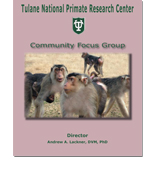 |
|
Community Focus - On April 1, 2004, the Director, Tulane National Primate Research Center (TNPRC) created a permanent Community Focus Group (CFG) to create and maintain an atmosphere of public trust and confidence between the TNPRC and the community. (Download PDF)

|
 |
|
Diseases We Investigate - Research at the Tulane National Primate Research Center focuses on human health problems that require the use of nonhuman primates to understand the disease. Our research often promotes or results in the development of diagnostics, therapeutics, and preventive strategies such as vaccines. The primary diseases and disease agents we study are: AIDS and HIV Infection, Human T-cell Leukemia Virus I, Krabbe’s Disease, Lyme Disease, Malaria, Microsporidiosis, Respiratory Syncytial Virus, Rotavirus, Tuberculosis, Varicella Zoster Virus, and West Nile Virus. This brochure provides brief descriptions of these diseases and our research efforts to combat them. (Download PDF)

|
 |
|
Educational Opportunities - One of the primary objectives of the Tulane National Primate Research Center (TNPRC) is to provide training for undergraduates and graduate students, veterinarians, postdoctoral fellows, veterinary students and visiting scientists. This brochure outlines the educational opportunities we have to offer these students and researchers. (Download PDF)

|
 |
|
Frequently Asked Questions - The nature of our research and the unusual animals we work with at the TNPRC generally prompt a variety of questions. This brochure provides answers to questions we are asked most frequently on these subjects. (Download PDF)

|
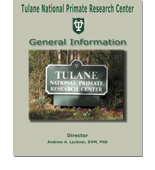 |
|
General Information - This brochure includes general information about the Tulane National Primate Research Center (TNPRC). Specific components are a brief overview about animal research in medicine, Director contact information, a listing of faculty by research division and their research interests, faculty editorial responsibilities, general definitions, other TNPRC informational brochures available, speaker bureau and tour contact information, contact information on the seven other National Primate Research Centers, and links to selected nonhuman primate web sites. (Download PDF)

|
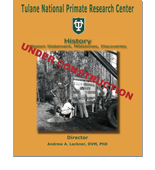 |
|
History: Mission Statement, Milestones, Discoveries - This brochure describes the mission that guides the Tulane National Primate Research Center programs and illustrates examples of significant milestones and discoveries of the past forty years. These discoveries have benefited the health and welfare of both humans and animals. (Download PDF)

|
 |
|
Nonhuman Primates - Nonhuman primates are a widely diverse group of animals. For a variety of scientific and historical reasons, the Tulane National Primate Research Center houses the following nine species of nonhuman primates for research use: baboon, cynomolgus macaque, green monkey, mangabey monkey (sooty and white-crowned), patas monkey, pigtailed macaque, rhesus macaque and squirrel monkey. The rhesus macaque of Indian origin is the most widely used of these species. This brochure provides brief descriptions of each of the species of nonhuman primates at the Tulane National Primate Research Center. (Download PDF)

|
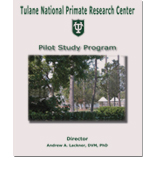 |
|
Pilot Study Program - The Tulane National Primate Research Center (TNPRC) Pilot Study Program provides funding to investigators who show promise of developing a career in nonhuman primate biomedical research or to those who wish to add a nonhuman primate component to an existing research program. The Pilot Study Program is also open to investigators with established nonhuman primate research programs who wish to develop substantially new research directions. (Download PDF)

|
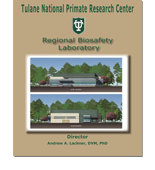 |
|
Regional Biosafety Laboratory - The Tulane Regional Biosafety Laboratory being built at The Tulane National Primate Research Center is a biosafety level three (BSL-3) facility. Research conducted in the facility will focus on the development of treatments, vaccines and diagnostics for emerging infectious diseases that occur naturally, such as Severe Acute Respiratory Syndrome (SARS) and against biological agents that have the potential for misuse for terrorism. The overall goal of research associated with this facility is to protect the health and safety of our community and the nation. This brochure provides information on what Tulane’s Regional Biosafety Laboratory will be and perhaps more importantly what it will not be. (Download PDF)

|
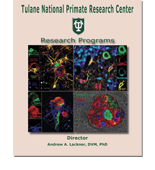 |
|
Research Programs - The Tulane National Primate Research Center is involved in a variety of important multidisciplinary projects focusing on areas of biomedical research with high priority concerns for human health. This brochure, which is intended for the interested researcher, scientist or investigator, provides information on those research programs and projects. The functions of each research program and project are discussed within the parameters of each division’s research, research resources and educational and training opportunities. You will note that many of the Research Programs are collaborative involving more than a single research division. (Download PDF)

|
|
 |
|
|
